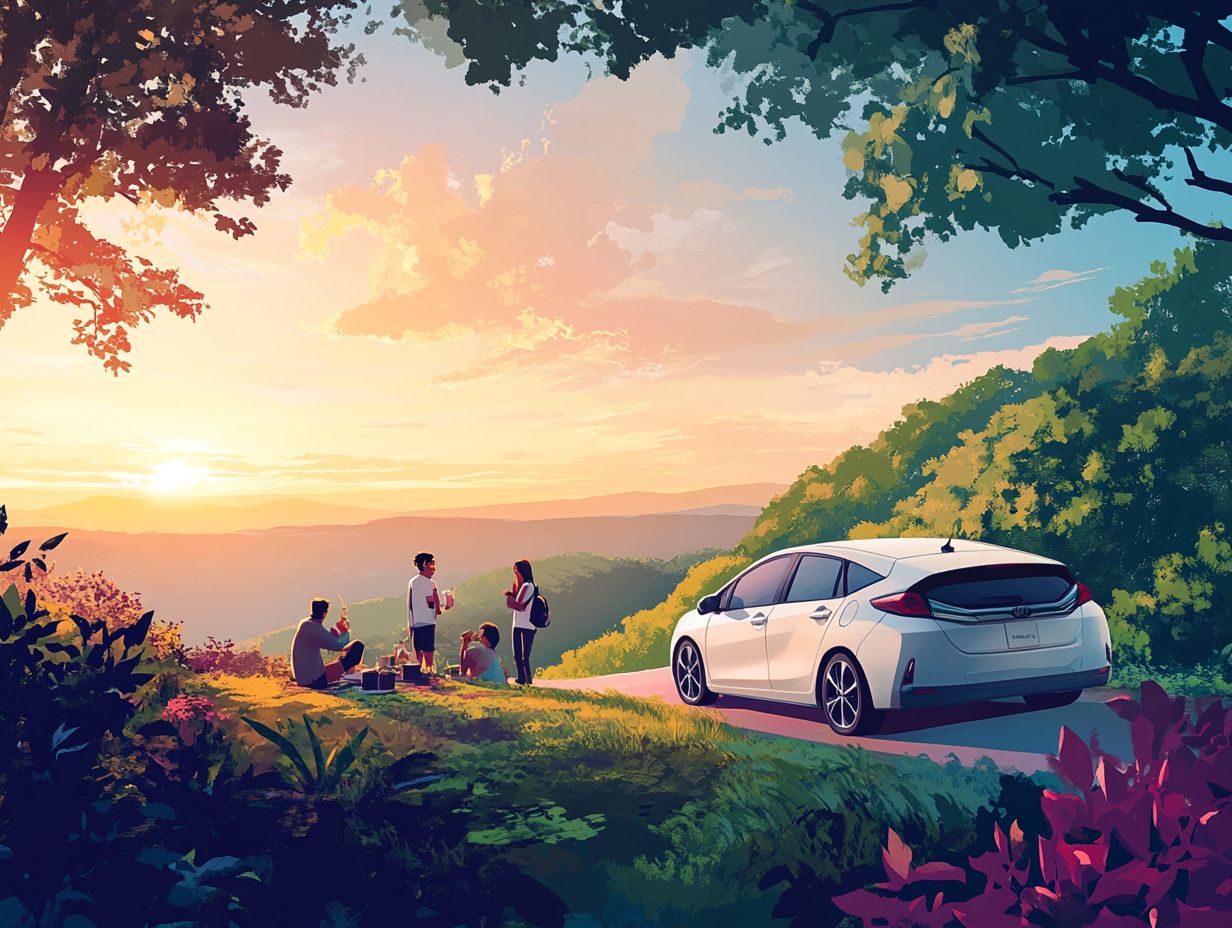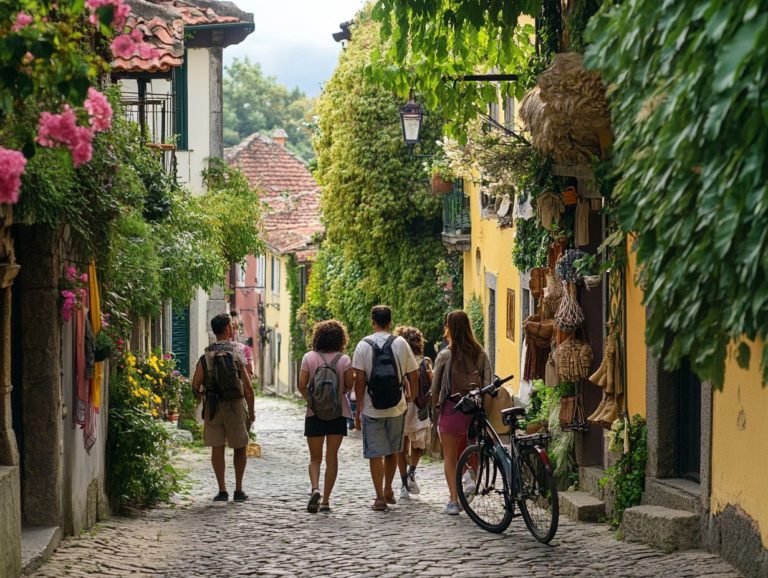Best Practices for Sustainable Road Trips
Embarking on a road trip is a timeless adventure, yet it’s vital to consider the environmental impact you leave behind.
Sustainable road trips hold significant value, emphasizing the positive effects you can have on the planet. From selecting eco-friendly destinations to opting for green transportation and accommodations, there are practical tips that can help you reduce waste and support local communities.
Start your thrilling journey toward sustainable travel today! Join in on a journey that preserves the beauty of our world for future generations.
Contents
- Key Takeaways:
- Importance of Sustainable Road Trips
- Planning for a Sustainable Road Trip
- Transportation Options for Sustainable Road Trips
- Eco-Friendly Accommodation and Activities
- Green Hotels and Camping Options
- Eco-Tourism Activities
- Reducing Waste on the Road
- Packing Reusable Items and Proper Disposal
- Supporting Local Communities
- Frequently Asked Questions
- What are the top tips for planning a sustainable road trip?
- How can I reduce my carbon footprint while on a road trip?
- What are some ways to conserve natural resources during a road trip?
- How can I make responsible food choices while on a road trip?
- What are some sustainable activities to do on a road trip?
- What are the benefits of practicing sustainable road trips?
Key Takeaways:

- Choose eco-friendly destinations and create a sustainable itinerary to reduce environmental impact and support local communities.
- Consider alternative modes of transportation, such as electric and hybrid vehicles, for a more sustainable road trip.
- Pack reusable items and practice proper waste disposal to minimize waste on the road and support sustainable practices.
Importance of Sustainable Road Trips
Sustainable road trips are essential for fostering environmentally friendly habits. They not only cut down on your impact on the environment linked to conventional travel but also deepen your appreciation for nature and breathtaking landscapes.
By opting for eco-friendly transportation options, such as electric or hybrid vehicles, you can significantly lower your emissions and reduce your environmental impact.
Sustainable road trips also let you and your loved ones immerse yourselves in meaningful outdoor activities, uncover local treasures, and support tourism that prioritizes eco-friendliness.
Environmental Impact and Benefits
The environmental impact of your road trips can be significant, especially when you embrace eco-friendly practices. These practices can greatly reduce your impact on the environment.
By prioritizing green accommodation options and sustainable travel habits, you play a vital role in nurturing a healthier planet. Choosing lodgings that utilize renewable energy and engage in waste reduction initiatives not only cuts down on greenhouse gas emissions but also promotes responsible tourism. To learn more, check out this guide on how to make your next trip more eco-friendly.
Every small action you take whether recycling, carpooling, or being mindful of your choices contributes to maintaining biodiversity and easing the strain on natural resources. You make a meaningful difference for the environment.
Planning for a Sustainable Road Trip
Planning for a sustainable road trip requires thoughtful preparation that enhances your travel experience. It begins with packing efficiently, ensuring you have everything you need while minimizing unnecessary bulk.
Consider using reusable containers to cut down on packaging waste. When it comes to food, opt for local produce instead of fast food chains, which supports local economies and enriches your journey with authentic flavors.
Your choices can transform a simple road trip into a conscious adventure.
Choosing Eco-Friendly Destinations
Choosing eco-friendly destinations can significantly enhance the sustainability of your road trip. By prioritizing green accommodations like eco-hotels and sites that promote sustainable transportation, you make a positive impact while elevating your travel experience.
This thoughtful approach minimizes your carbon footprint while supporting local conservation efforts. Consider visiting national forests and state parks known for their commitment to protecting natural ecosystems.
By selecting these destinations, you can immerse yourself in scenic beauty and participate in eco-friendly activities such as hiking, bird-watching, or wildlife photography.
Opting for eco-hotels that utilize renewable energy sources and prioritize waste reduction greatly contributes to sustainable tourism practices. Each journey you take becomes more meaningful, leaving a positive legacy for future generations.
Plan your sustainable road trip now and make a difference!
Creating a Sustainable Itinerary

Creating a sustainable itinerary is crucial for your eco-friendly road trip. It allows you to focus on outdoor activities that showcase local gems while minimizing your environmental impact.
This thoughtful approach elevates your experience and deepens your connection to the places you visit. By prioritizing eco-conscious adventures like hiking through preserved parks, kayaking on serene lakes, or engaging in local conservation efforts you must immerse yourself in nature.
Supporting local businesses such as family-owned lodges, organic farms, and artisan markets not only energizes the community but also enriches your travel experience. This choice boosts the local economy and provides authentic experiences that beautifully reflect the unique culture and environment of the area.
Every journey you embark on can be both memorable and meaningful.
Transportation Options for Sustainable Road Trips
When you think about transportation options for sustainable road trips, electric vehicles and hybrid cars emerge as the premier choices. Their impressive fuel efficiency and capacity to substantially lower emissions make them ideal for eco-conscious travelers like you.
Electric and Hybrid Vehicles
The Chevrolet Bolt EV stands as a premier electric vehicle. It showcases how cutting-edge technology can enhance sustainable road trips through remarkable fuel efficiency and significant emissions reductions.
This innovative model offers an impressive range on a single charge, making long-distance travel a breeze. It also features advanced regenerative braking systems, which capture energy while slowing down, optimizing energy efficiency.
As you explore eco-friendly options, the Bolt EV shines brightly alongside noteworthy contenders in the market, like the Tesla Model 3 and the Hyundai Kona Electric. Together, these vehicles demonstrate a meaningful decrease in greenhouse gas emissions while elevating your driving experience with instant torque and smooth acceleration.
With the expanding network of charging infrastructure, you’re well-positioned to embrace greener travel. For those looking to enhance their eco-friendly adventures, consider checking out traveling sustainably: a beginner’s guide. This paves the way for more environmentally conscious road trips.
Alternative Modes of Transportation
Exploring alternative modes of transportation, like biking, hiking, and camping, can significantly enhance the sustainability of your road trips. By incorporating these eco-friendly options, you reduce emissions and elevate your travel experience.
When you embrace these choices, you minimize your carbon footprint while immersing yourself in the stunning beauty of nature. For example, biking along scenic trails offers an intimate connection to the landscape.
Hiking not only promotes physical fitness but also allows you to revel in the great outdoors. Opting to camp under the stars instead of staying in hotels deepens your appreciation for natural habitats and wildlife.
Each of these activities encourages sustainable practices, such as using reusable gear and supporting local economies. For those planning a getaway, consider exploring eco-conscious road trips. This ultimately makes your outdoor adventures not just more enjoyable, but also more responsible and enriching.
Eco-Friendly Accommodation and Activities
Choosing eco-friendly accommodations and activities is essential for a sustainable road trip. This approach allows you to indulge in eco-hotels and unique camping experiences while fully embracing environmentally friendly travel activities that highlight local produce.
By making these conscious choices, you elevate your travel experience and contribute positively to the environment.
Green Hotels and Camping Options

Choosing green hotels and eco-friendly camping options supports sustainable practices and significantly reduces the environmental impact of your road trip.
By opting for eco-friendly lodging, you can enjoy unique experiences while actively contributing to the preservation of our planet. Many eco-hotels hold certifications such as LEED and Green Key, which ensure that they follow eco-friendly practices. You’ll find features like solar energy systems, water conservation initiatives, and organic amenities that enhance your stay.
When exploring camping sites, seek those that promote low-impact practices and offer eco-conscious facilities. A little research can unveil hidden gems that provide unforgettable experiences, all while championing environmental stewardship in the great outdoors.
Eco-Tourism Activities
Engaging in eco-tourism activities elevates your road trip experience, allowing you to appreciate nature while discovering hidden local gems.
Exploring the great outdoors through guided nature walks immerses you in the rich tapestry of local flora and fauna. This provides a deeper understanding of the region s ecosystems. These enriching experiences, often led by knowledgeable local guides, nurture your appreciation for nature and educate you about essential conservation efforts.
Visiting community gardens reveals the beauty of sustainable practices and highlights the importance of local food systems. This offers you the chance to interact with residents and learn about their initiatives to promote biodiversity. Such activities enhance your travel itinerary and support local economies by emphasizing the significance of preserving unique environments.
Reducing Waste on the Road
Reducing waste on the road is essential for achieving sustainable travel. By embracing reusable items and minimizing packaging, you can drastically cut down on single-use plastics.
This conscious effort enhances your travel experience and contributes to a healthier planet. Act now to make a difference!
Packing Reusable Items and Proper Disposal
Packing reusable items is crucial for reducing waste. This allows you to sidestep single-use plastics while ensuring any waste you generate during your trip is disposed of responsibly.
By choosing reusable containers, cutlery, and bags, you significantly diminish your environmental impact and foster a culture of sustainability. Incorporating a range of reusable items not only helps minimize plastic waste but also encourages mindful consumption while you travel. To enhance your efforts, consider following the top sustainable travel practices. It’s essential to stay informed about responsible disposal methods.
For example, make the most of local recycling programs and composting options whenever possible. By championing conscientious waste management and prioritizing reusable alternatives, you play a vital role in protecting natural resources and preserving the ecosystems you encounter. Additionally, consider using tips for sustainable travel with children to enhance your eco-friendly practices while exploring new places.
Supporting Local Communities
Supporting local communities is essential for your sustainable road trips. You have the opportunity to prioritize local produce and engage with sustainable businesses while practicing eco-friendly habits that benefit the environment and invigorate local economies.
Buying Local and Supporting Sustainable Businesses

Buying local produce helps travelers engage in eco-friendly habits. This can positively impact both tourism and the economy.
Shopping at farmers’ markets means enjoying fresh, seasonal ingredients. You also support local farmers and savor unique regional flavors.
Visiting community gardens connects you with locals. You also learn about sustainable farming practices firsthand. This enriches your travel experience with authentic interactions.
By embracing this approach to travel, you play a vital role in fostering eco-friendly travel, ensuring that your journey leaves a lasting and beneficial impact on the places you visit. For tips on planning your trip, check out how to plan a sustainable travel itinerary.
Frequently Asked Questions
What are the top tips for planning a sustainable road trip?
- Choose a fuel-efficient vehicle.
- Pack light to save fuel.
- Plan your route wisely.
- Stay in eco-friendly accommodations.
- Support local businesses.
- Use reusable products.
How can I reduce my carbon footprint while on a road trip?
- Drive at a steady pace to save fuel.
- Use cruise control when possible.
- Avoid unnecessary idling.
- Offset your carbon emissions.
- Carpool or take public transportation.
- Plant trees to help offset emissions.
What are some ways to conserve natural resources during a road trip?
- Pack reusable items instead of single-use products.
- Use eco-friendly cleaning products.
- Conserve water during your trip.
- Dispose of waste properly to avoid littering.
- Use sustainable energy sources when camping.
- Respect local wildlife.
How can I make responsible food choices while on a road trip?
- Bring reusable containers for snacks and meals.
- Buy local and seasonal food items.
- Avoid plastic water bottles by using a reusable one.
- Choose sustainable seafood options.
- Compost food waste if camping.
Start making eco-friendly choices on your next road trip! Every small effort counts in preserving our planet.
What are some sustainable activities to do on a road trip?
- Hike and explore nature: Stop at national parks or natural areas to hike, bike, or observe wildlife.
- Visit eco-friendly attractions: Look for tours or sites that support sustainable tourism.
- Volunteer for local environmental projects: Many places offer chances to help with conservation efforts.
- Attend local events and festivals: Immerse yourself in local culture by joining events that promote sustainability.
- Opt for low-impact activities: Choose kayaking, paddleboarding, or horseback riding over jet skiing or off-roading.
- Leave no trace: Follow the “Leave no Trace” principles and improve the places you visit.
What are the benefits of practicing sustainable road trips?
- Reduces carbon footprint: Using eco-friendly methods decreases the environmental impact of your trip.
- Saves money: Fuel-efficient vehicles and eco-friendly accommodations can lower your travel costs.
- Supports local communities: Choosing local businesses helps boost the economies of the areas you visit.
- Promotes responsible tourism: Sustainable practices minimize the negative effects of travel.
- Encourages environmental awareness: Being mindful of our travel impact helps us make better choices every day.
- Allows for more authentic experiences: Connect with nature and local cultures for deeper, more fulfilling experiences.






